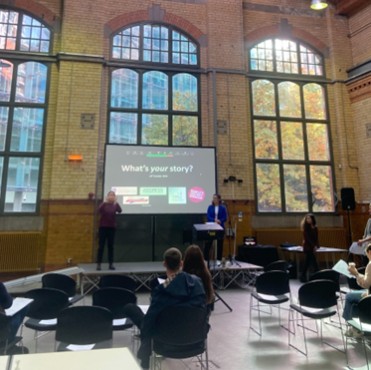
Caterina Guardamagna (right), welcoming guests to the event, with BSL interpretation from Pam Jones (left)
On Sunday 16th October, the What’s Your Story? event took place at the People’s History Museum in Manchester. Co-hosted by Caterina Guardamagna, lecturer in English Language and Linguistics at University of Liverpool, and Saul Leslie, PhD student in literary disability studies also at University of Liverpool, the event was created as a space for disabled people to tell their stories. The day was hoped to encourage thought-provoking debate around philosophy, ethics, and media in relation to disabled people’s cultural identities. The event also acted as a launch for ADDRESS, an organisation stiving to promote disabled people’s liberation in Merseyside and Halton.
With the event’s focus being the experiences of disabled people within society, an ‘Expression Wall’ had been created for attendees to tell their stories, provide feedback, and contribute to the overall discussion of the day. Similarly, there was a stall curated by Saul with ADDRESS, displaying various books which tell different perspectives of disability within literature. Ali Dodds, a member of University of Liverpool’s Disability Society explained how the books amplify disabled voices, highlighting that disabled people are here and exist, and ultimately that “we are visible”. Next to this, was a display by TRU, a specialist provider of acquired brain injury rehabilitation, showcasing artwork created by some of their clients, under the brief “what’s your story”. TRU offers numerous different vocational placements as part of their rehabilitation process, and the artwork on display at the event was just one example of this. The placements are designed to help with all aspects of rehabilitation, such as physiotherapy, as well as bringing more purpose to daily life.
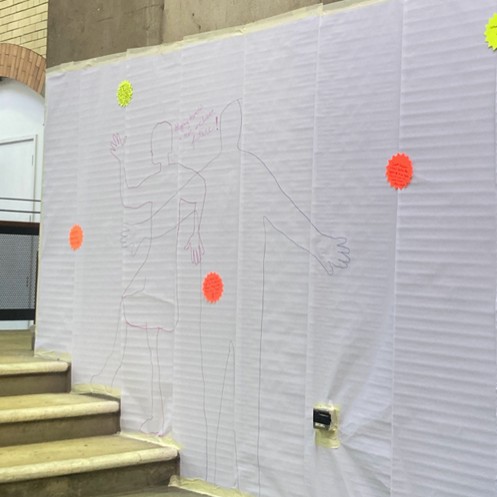
The expression wall, for guests to contribute to
After a welcome from Caterina Guardamagna, outlining the purpose and format of the event, guests heard from Saul Leslie. He began by reading from his own semi-fictional creative writing about the aftermath of an epileptic seizure, and the associated trauma. From this, he moved towards an interesting discussion of his academic research and the history of normalcy. Saul referred to Lennard J. Davis’ work, Enforcing Normalcy, and the link between the concept of normality and eugenic thinking. Saul also played a recorded message from Rosie Cooper MP, as she explained the recent success of her campaign for the British Sign Language (BSL) Bill in Parliament, which means that BSL will be legally recognised as a language. Rosie Cooper couldn’t attend the event in person for safety reasons as she was recently the victim of a murder plot by a far-right extremist. This emphasised Saul’s discussion of the dangers of eugenic thinking behind normalcy within society.
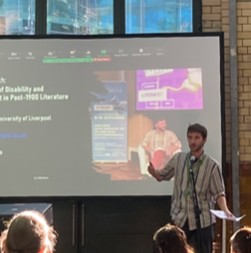
Saul Leslie, co-host of the event, leading his talk
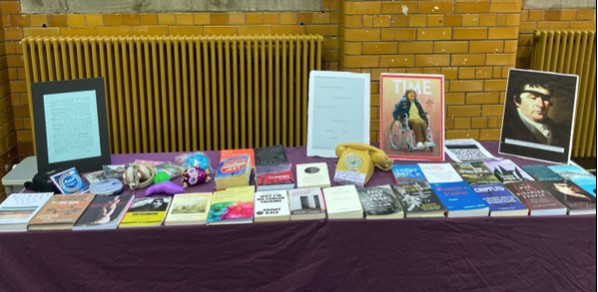
The book stall curated by Saul Leslie with ADDRESS
Next, was Lisa Davies’ segment, “Fucked”: Diary of a Disabled PhD Student. Davies discussed her doctoral study, Writing the Disabled Self: An Autoethnographic Study of Disablism in England 2015-2018, reading from the diary she wrote during her time as a student. One of Lisa’s main emphasises was the downfall of public transport, and the disempowerment of being at the mercy of railway staff. She described being left on a train or forgotten about by railway workers, and how this makes travelling not only a physical challenge, but a greatly psychological one as well. Lisa’s talk led to a thought provoking and passionate discussion of how society disables individuals rather than their impairments, with multiple guests sharing their experiences with railway travel, and how this removes the freedom of spontaneity for a lot of individuals.
Following a short break for lunch, guests heard from Trevor Landry and Joe Dooley, with their talk, Acquired Brain Injuries: Four Stories by TRU. One of the stories focused on the person-centred nature of rehabilitation at TRU, through vocational placements, and the enrichment experienced by one particular client who had been a doctor before sustaining a brain injury on holiday. The client, who Trevor referred to as Doctor John (all names had been changed for privacy) found enjoyment in helping out with some aspects of treatment, such as checking people’s blood pressures, putting his previous skills as a doctor in action while going through his rehabilitation process.
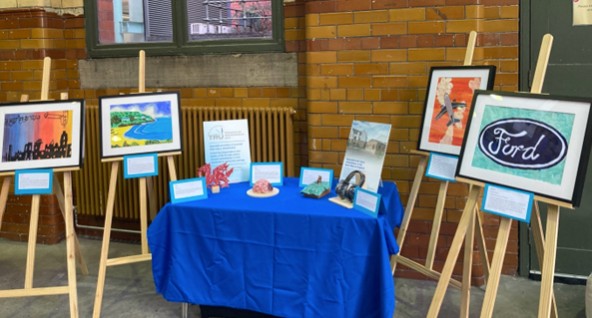
Artwork created as part of the person-centred rehabilitation at TRU
The day was finished with a panel discussion about SOTA member of staff Daniel O’Connor’s debut novel, Nothing, between himself, Saul Leslie, and PhD student Natalie Wall. Daniel O’Connor is the Colm Tóibín Lecturer in Creative Writing at the University of Liverpool. The novel follows his protagonist, Michael, who sustains a brain injury which leaves him with no memory of his life beforehand. Alongside this, Michael gains an ability to imagine things out of existence, bringing a newfound sense of power to his everyday life. In the novel, O’Connor explores readjustment, viewing the world differently, and a sense of new life alongside the feeling of ‘coming home’. This made for an interesting discussion between himself, Saul and Natalie, following the stories from TRU of people living with acquired brain injuries.
The What’s Your Story? event took place ahead of Nothing About Us Without Us – Disabled People’s Activism: Past, Present and Future, an exhibition running at the People’s History Museum from 16th November 2022 until 16th October 2023. The exhibition is to be curated by four community curators, who each identify as disabled people, and will explore how the history of disabled people is documented, interpreted and communicated.